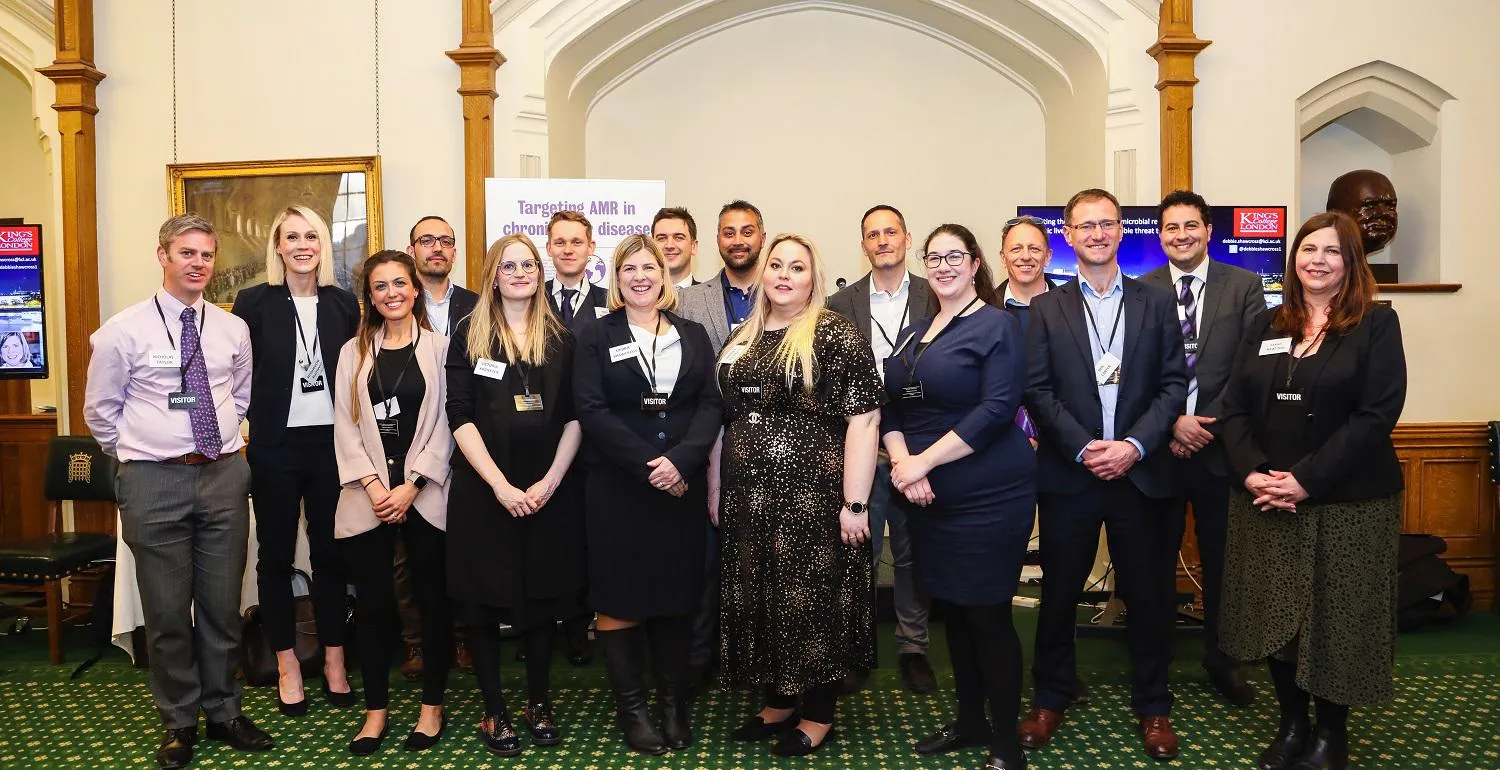People with liver disease are more prone to infections which are often resistant to antibiotics and may lead to an early death. These individuals have more ‘bad’ than ‘good’ gut bacteria in their gut which increases the risk of infection in these patients. By isolating the bacteria from healthy faecal samples, and putting it into capsules that patients take at outpatient appointments, we hope to increase the number of healthy gut bacteria and by doing so reduce the chances of serious infections
Professor Shawcross, from the School of Immunology & Microbial Sciences
25 March 2022
King's hosts antimicrobial resistance awareness event at Westminster
On Tuesday 22nd March, King’s hosted the event Tackling Antimicrobial Resistance in Liver Disease in the Churchill Rooms at the Houses of Parliament.
The event was held in partnership with The British Liver Trust (BLT) and The All-Party Parliamentary Group (APPG) on Liver Disease and Liver Cancer and was funded by the National Institute of Health Research. King’s researchers welcomed Members of Parliament and Members of the House of Lords. In attendance were representatives from The APPG on Antibiotics and The APPG for The Human Microbiome.
Also present were policymakers, public health leaders, representatives from the World Health Organisation, hepatologists, microbiologists, experts in antimicrobial resistance, European microbiome and Liver consortiums such as MICROB-PREDICT, EF-Clif, The European Academic FMT Network, The British Association for the Study of Liver Disease (BASL) and the British Society for gastroenterology's Gut Microbiota for Health Expert Panel. Patients and patient representative groups, such as the BLT, Guts Charity UK and The European Liver Patients Association (ELPA), and UKRI funders were there to discuss new innovative research that hopes to tackle antimicrobial resistance (AMR).
The event sought to highlight the evolving crisis of chronic liver disease in the UK with prevalence and mortality increasing exponentially. Drug-resistant infections have been causing half a million deaths every year worldwide and this number continues to grow. Patients with liver cirrhosis are at particularly high risk for antimicrobial resistance because they are predisposed to bacterial infection which typically results in hospitalisation, with high mortality.

Finding effective ways to treat resistant bacteria is a focus of the PROMISE trial. The trial, led by Professor Debbie Shawcross, will investigate whether giving a Faecal Microbiota Transplant (FMT) - often known as a ‘poo transplant’ - to people with liver disease can clear up infections that are resistant to antibiotics. Patients will be given capsules of freeze-dried stool which doesn’t dissolve until it reaches the lower gut. Bacteria in the bowel help to balance the body by building a strong immune system. Antibiotics, and conditions such as liver cirrhosis can upset this balance predisposing patients to severe infection, hospitalisation with a high risk of death. Giving these patients healthy gut bacteria with a poo transplant could help to prevent this.
Stephen McPartland MP, who co-hosted the event in parliament, and is the Co-Chair of the APPG for Liver Health and Liver Cancer, said, “The Lancet published findings in 2022 that drug-resistant infections are now a leading cause of death worldwide, with 1.27 million alone in 2019. The UK has the potential to be a world leader in this important area.
"We have previously conducted The Lord O’Neil review, a world-leading review predicting the scale of this crisis with recommendations of how to tackle the problem. We have set out a road map in our UK’s five-year national action plan. Antimicrobial resistance (AMR) has been reconfirmed recently at the G7 as a priority issue. We need politicians to ensure that there is appropriate investment and a national treatment infrastructure and further research funding so that this important research and other similar studies can continue."
A secondary outcome of the trial is to discover whether poo transplants can reduce the side effects of liver disease and the incidence of ‘super-bug’ infections, which can lead to hospital admissions and death. If the research is successful, this could have implications for other areas of healthcare. Poo transplants could be used as a strategy to avoid antibiotic use in other chronic disease conditions.
Also in attendance was Pamela Healy OBE the CEO of The British Liver Trust and her team. On behalf of the patients and The British Liver Trust, she commended the work already undertaken, highlighting the rising tide of liver disease in the UK and called for urgent action and funding to tackle the high rates of liver disease and antimicrobial resistance in liver disease patients. She stressed that this is an opportunity to improve outcomes for patients living with liver disease both in the UK but also globally and that the UK is in a unique position to be a global leader.
Dr Lindsey Ann Edwards, the Research Director for the faecal microbiota transplant programme and the project lead on AMR in Liver Disease at the School of Immunology & Microbial Sciences, presented data generated from the NIHR-funded PROFIT trial (the precursor to PROMISE).
She said: “I call on everyone to act now! Antibiotics save lives, but antimicrobial resistance is a coming plague. Targeting AMR in Liver disease could make a significant global impact. Faecal microbiota transplant is now proven to reduce the carriage of AMR genes. We need to continue this important research and we need further research funding and investment in infrastructure.”
Dr Harriet Boulding of The Policy Institute at King’s launched the policy document entitled ‘Targeting AMR in chronic liver disease’ which the King’s group and collaborators have produced.
Dr Harriet Boulding also highlighted “the importance that we continue the momentum of this programme of work. Continuing to engage with all the key stakeholders to drive policy implementation, which will require further research funding and appropriate investment in national treatment infrastructures.”
Watch an animation about the life-saving possibilities of poo transplant below.



